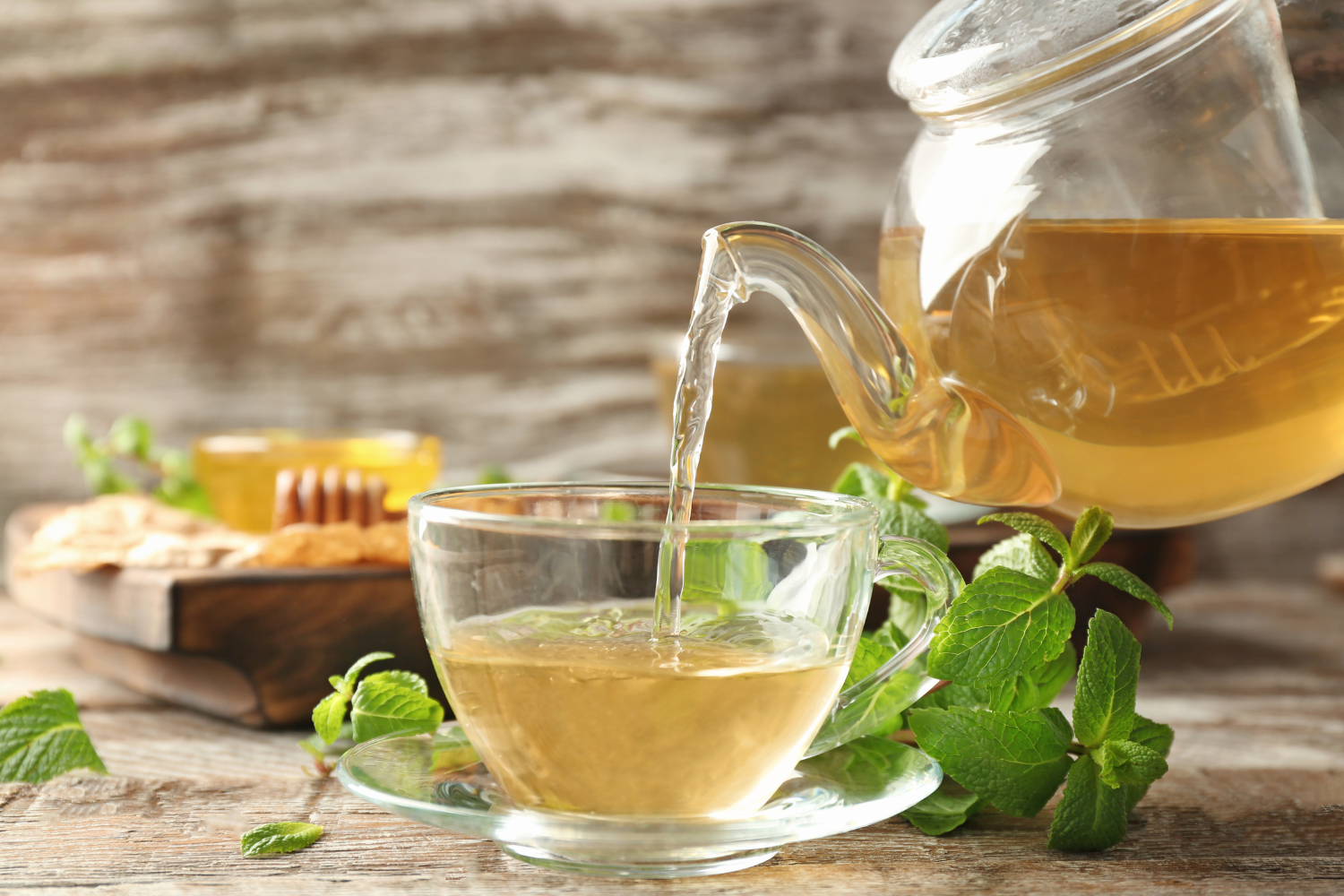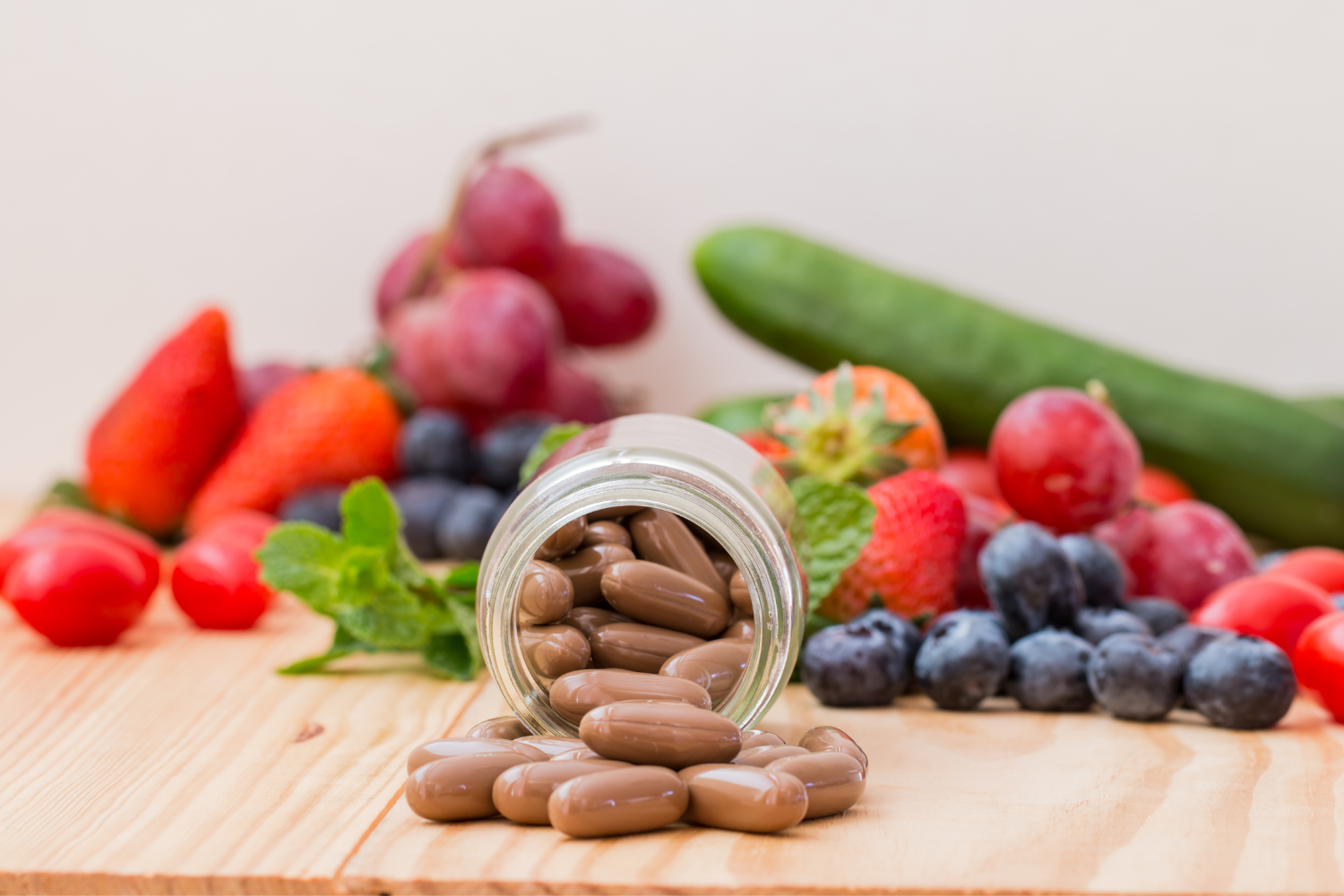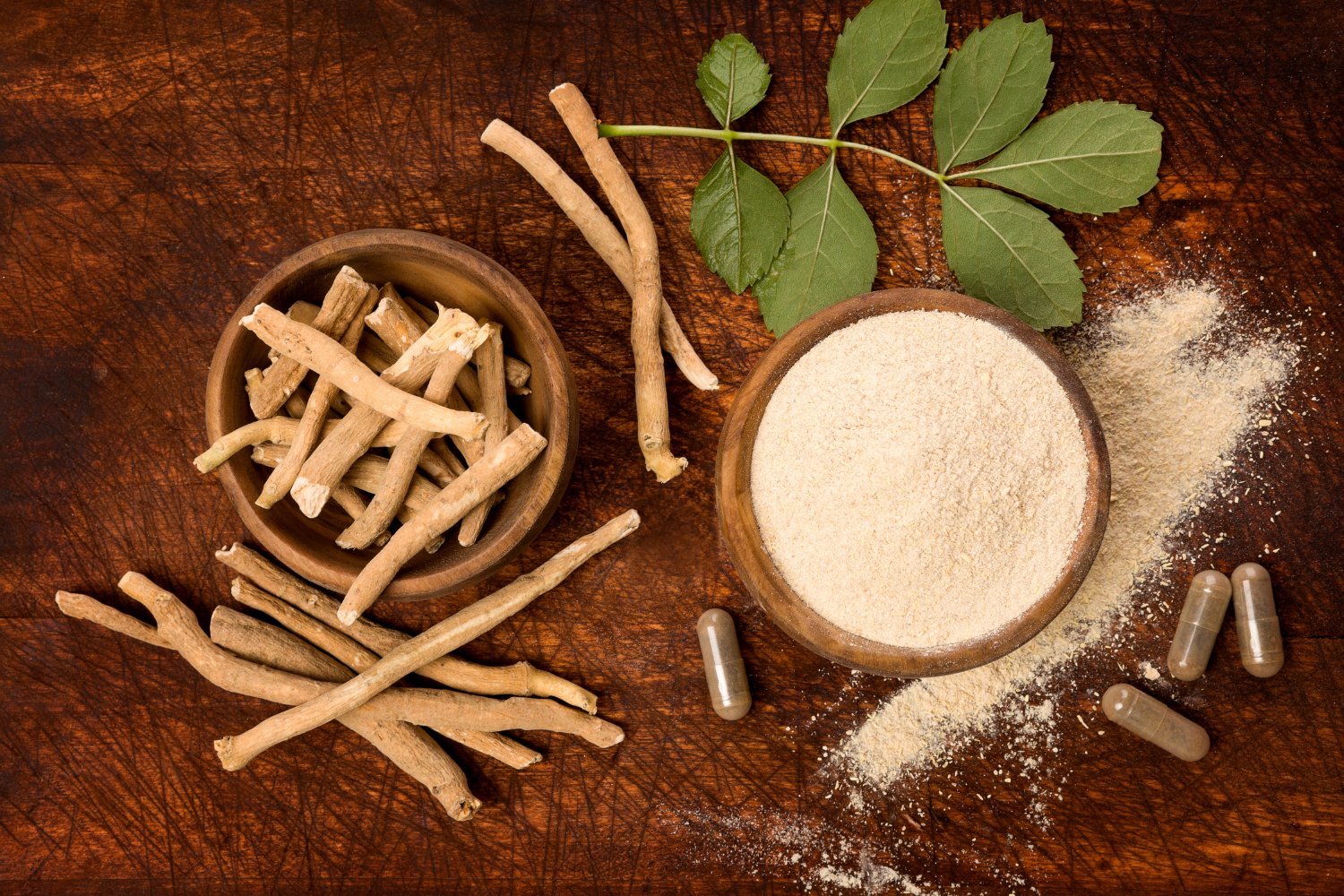Stress and mood-related challenges are becoming more common as individuals navigate demanding lifestyles and constant digital engagement. Nutrition brands have a growing opportunity to meet consumer demand for natural wellness solutions that support stress relief and mood support.
With the right blend of vitamins, minerals, and herbs—such as ashwagandha, l-theanine, folic acid, and lemon balm—brands can develop supplements that support stress management, promote a balanced mood, and support overall mental well-being. Offering third-party tested, non-GMO, gluten-free daily supplements can build trust, support regulatory compliance, and create long-term customer loyalty in a competitive wellness market.

Table of Contents
ToggleUnderstanding Stress Relief & Mood Support Supplements
Stress relief and mood support supplements help the body manage stress, promote a positive mood, and improve mental clarity. These supplements often contain vitamins, minerals, amino acids, and herbs that support the nervous system and help regulate mood and stress levels.
Ingredients like B vitamins, magnesium, folic acid, and ashwagandha work together to support relaxation, energy balance, and emotional resilience. Some ingredients are studied for their potential role in supporting healthy cortisol levels and serotonin activity, which may contribute to a calm, focused state—helping people feel more balanced in their daily lives.

Common Use Cases
Stress and mood support supplements are used by many consumers who need help managing daily challenges and staying focused. Below are some common use cases:
- Busy professionals: Managing daily stress and improving focus during long work hours.
- Hormonal changes: Supporting a balanced mood during PMS, menopause, postpartum, or pregnancy.
- Students and wellness enthusiasts: Enhancing relaxation, focus, and alertness while studying or working out.
- Parents: Coping with stress and supporting energy and mood during parenting and breastfeeding.
- Shift workers or those with insomnia: Promoting relaxation in the evening or before bed.

Common Types of Stress Relief & Mood Support Supplements
Stress and mood support products are available in different forms to match consumer preferences and intended use. These formats allow flexibility in how supplements are taken and how often they’re used.
- Capsules/Tablets: Easy to take daily supplements, ideal for stress support blends with herbs like ashwagandha, holy basil, or Rhodiola rosea.
- Powders: Great for mixing into food or drinks, offering customizable servings of magnesium, amino acids, or other ingredients.
- Gummies: A popular choice for delivering mood support with ingredients like l-theanine, folic acid, and B vitamins.
- Teas: Soothing and often used in evening routines, featuring calming herbs like chamomile, lemon balm, or lavender.

Benefits of Offering Stress Relief & Mood Support Supplements
Adding these supplements to your product line brings practical benefits to your customers and your business.
Meeting Consumer Demand for Mental Wellness
More people are turning to natural supplements to support the body’s response to occasional stress and emotional balance. They’re looking for safe, effective options that don’t involve medication.
Health-conscious consumers are especially drawn to clean, plant-based products that help them feel calm, stay focused, and naturally support mood and stress levels.
Expanding Product Lines to Enhance Wellness Portfolios
Stress relief supplements fit well alongside other categories like sleep aids, immune support, and energy blends. This allows your brand to offer a full wellness solution.
They can also be bundled with daily supplement packs that target relaxation, focus, and overall balance—giving your customers more value and helping boost product sales.
Building Brand Trust Through Science and Quality
Offering stress support products backed by clinical studies and research helps position your brand as a trusted leader in the wellness space. Using ingredients that support serotonin activity, promote relaxation, and support resilience makes a difference.
Clean-label options like non-GMO, gluten-free, and third-party tested formulas also appeal to consumers looking for quality, transparency, and safe ingredients—especially those avoiding allergens or heavy metals.

Key Ingredients in Stress Relief & Mood Support Supplements
Effective stress support and mood supplements rely on ingredients that help regulate mood, reduce stress, and promote relaxation. The right blend of herbs, vitamins, and amino acids can support a calm mind and balanced mood throughout the day.
Adaptogens
Adaptogens help the body respond better to stress and maintain energy without overstimulation.
Ashwagandha is one of the most studied adaptogens. It helps maintain normal cortisol response and supports a calm, focused state throughout the day.
Rhodiola Rosea helps improve energy and reduce mental fatigue. It’s known for boosting resilience and supporting mood and stress levels under pressure.
Calming Nutrients
Calming nutrients helps the nervous system relax while supporting focus and mental clarity.
Magnesium plays a key role in relaxing muscles and nerves. It helps reduce tension and support better sleep, especially when stress levels are high.
L-Theanine promotes a sense of calm without causing drowsiness. It’s a good option for daytime stress relief and maintaining focus during work or study.
Herbal Extracts
Herbal extracts have been used for centuries to help the body relax and feel calm.
Chamomile is commonly used to ease anxiety and promote better sleep. It’s often included in teas or capsules intended for evening use.
Lemon Balm supports emotional balance and helps calm racing thoughts. It’s a popular herb in non-drowsy daytime stress relief blends.
Specialty Ingredients
Some specialty ingredients target specific areas of the brain to support mood and relaxation.
5-HTP (5-Hydroxytryptophan) supports serotonin activity, which helps promote a positive mood and relaxation.
GABA (Gamma-Aminobutyric Acid) helps calm the nervous system and regulate mood. It’s used to support relaxation and reduce overstimulation.

Steps for Nutrition Brands to Develop Stress Relief & Mood Support Supplements
Creating a successful stress and mood support product requires thoughtful planning—from research to marketing.
Conduct Market Research to Identify Consumer Needs
Understanding who your product is for helps shape every step of development. Busy professionals, students, and women experiencing hormonal changes are common target groups.
Explore trends in clean-label products, adaptogens, and ingredients like l-theanine or folic acid that support mental wellness.
Source High-Quality, Clinically Validated Ingredients
Work with trusted suppliers that offer standardized extracts and third-party tested ingredients.
Choose ingredients backed by research, such as ashwagandha, 5-HTP, or B vitamins, to ensure your formulas are effective and safe.
Formulate Thoughtfully to Maximize Efficacy
Combining ingredients that work well together—like magnesium and l-theanine—can improve overall results.
Ensure your formula is formulated for regular use with commonly well-tolerated ingredients.
Design Compliant and Eye-Catching Packaging
Follow guidelines for supplement facts and avoid unsupported health claims like “cures anxiety” or “treats disease.”
Use clean, calming visuals and easy-to-read fonts to help your product stand out while communicating stress support benefits clearly.
Launch and Market Strategically
Focus on educating customers about how ingredients support mood and reduce stress. Include clear, helpful explanations in product descriptions.
Customer testimonials and reviews help build trust and show how your product supports real-life stress and mood challenges.
Marketing Strategies for Stress Relief & Mood Support Supplements
Reaching the right audience takes a focused approach that speaks to their daily needs and emotional wellness goals.
Focus on Emotional Connection
Use phrases like “reduces stress naturally” and “supports a balanced mood” to connect with your audience’s goals.
In blog posts or ads, share real-life moments like staying calm during work stress or winding down after a busy evening.
Partner with Wellness Influencers
Collaborate with yoga instructors, wellness coaches, or mental health influencers who align with your brand values.
These partnerships can increase awareness and provide social proof that your stress relief supplements are trusted and effective.
Offer Trials and Subscription Plans
Giving first-time customers samples or discounted bundles helps them try your products without a big commitment.
Set up monthly subscription plans to offer convenience for users seeking consistent support for mood and stress levels.

Final Thoughts on Creating Stress Relief & Mood Support Supplements
The demand for stress relief and mood support supplements continues to grow as consumers seek effective ways to manage mental and emotional health. Nutrition brands that offer clean-label, third-party tested products using trusted ingredients like folic acid, l-theanine, and ashwagandha are well-positioned to earn customer trust.
Focusing on quality, science-backed formulations supporting mood and physical balance helps brands stand out and build long-term loyalty in a competitive wellness market.
Frequently Asked Questions
What certifications should stress relief supplements have?
GMP certification, third-party testing, and allergen-free or vegan certifications as applicable.
How long does it take to develop a stress relief product?
Typically 6–12 months, including formulation, testing, and regulatory approval.
What are the most popular ingredients in stress relief supplements?
Adaptogens like ashwagandha, calming nutrients like magnesium, and herbal extracts like chamomile and lemon balm.
Are stress relief supplements safe for daily use?
Most are safe when used as directed, but formulations should prioritize non-habit-forming ingredients.
Can stress relief supplements be combined with other wellness products?
Yes, they pair well with sleep aids, energy boosters, or immunity supplements for holistic health solutions.
References
- Maffei M. E. (2020). 5-Hydroxytryptophan (5-HTP): Natural Occurrence, Analysis, Biosynthesis, Biotechnology, Physiology and Toxicology. International journal of molecular sciences, 22(1), 181. https://doi.org/10.3390/ijms22010181
- National Center for Complementary and Integrative Health. (2020). Rhodiola: Usefulness and Safety. https://www.nccih.nih.gov/health/rhodiola
- National Institutes of Health. (2022). Folate – Health Professional Fact Sheet. https://ods.od.nih.gov/factsheets/Folate-HealthProfessional/
- National Institute of Mental Health. (2021). GREAT: Helpful Practices to Manage Stress and Anxiety. https://www.nimh.nih.gov/news/media/2021/great-helpful-practices-to-manage-stress-and-anxiety
- National Institutes of Mental Health. (2023). Perinatal Depression. https://www.nimh.nih.gov/health/publications/perinatal-depression
- Thau L, Gandhi J, Sharma S. Physiology, Cortisol. [Updated 2023 Aug 28]. In: StatPearls [Internet]. Treasure Island (FL): StatPearls Publishing; 2025 Jan-. Available from: https://www.ncbi.nlm.nih.gov/books/NBK538239/
- U.S. Food and Drug Administration. (2023). Current Good Manufacturing Practices (CGMPs) for Food and Dietary Supplements. https://www.fda.gov/food/guidance-regulation-food-and-dietary-supplements/current-good-manufacturing-practices-cgmps-food-and-dietary-supplements




